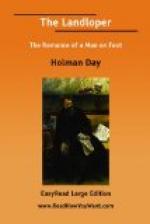“Well, if I’m any good on a guess,” snorted Dodd, “that renegade who just insulted me is down in your books, somewhere. You’d better hunt.”
“It’s slow work and eats up time,” sighed Mr. Mullaney.
Dodd looked at him for a time and then began to pull crumpled bills from his waistcoat pocket. He straightened five ten-dollar bills, creased them into a trough, and stuck the end toward the detective.
“Follow his trail back. I never heard of your book scheme before. Take this money for a starter. If you can’t find him in your books, pick out half a dozen of the worst crimes any man can commit and hitch ’em on to him somehow,” urged Dodd, with fury. “Go after him. And when we get him good and proper I want to do some gloating through the bars. He’s the first man who ever smacked my face for me—and I’ll see that he gets his.”
He left Mr. Mullaney stowing the money away in a big wallet which was stuffed with newspaper clippings. He hurried in to the bar, gulped down a drink, and then went to the office desk and examined the hotel register. Anger and zest for revenge were stimulating in him a lively interest in that meeting which Farr seemed to be promoting. Mr. Dodd did not care especially what kind of meeting it was. He had set forth to camp on Walker Farr’s trail and do him what hurt he could.
Dodd was a well-posted political worker. The names of the men were not names especially prominent in state politics, but his suspicions were stirred when he saw that all counties in the state were represented. And no more were arriving. He decided that the conference must be in session.
Dodd avoided the elevator. He tramped up the broad stairs to the floor above the office. The doors of the large parlor were closed. He turned the knob cautiously; the doors were locked. He heard within the dull mumble of many voices—men in conversation. It was evident that the formal meeting, whatever it might be, had not begun its session. He tiptoed away from the door and climbed another flight of stairs.
There were no nooks and corners of the old National Hotel which Richard Dodd did not understand in all their intricacies. As his uncle’s political scout it had been his business to know them.
He hunted along the corridor until he found a maid.
“Is there anybody in Number 29?” he asked.
“Two of that new crowd that just came in have it, Mr. Dodd. But they have gone down-stairs again.”
He wadded a bill in his palm and jammed it into her hand. “Let me in with your pass-key, that’s a good girl. It’s all right. I won’t disturb their stuff. I only want to listen. You understand! There’s a political game on. I want to get to that ventilator in the closet—you know it!”
“Oh, if it’s only politics, Mr. Dodd!” she sniffed, with the scorn of a girl who has seen many conventions come and go, knew the little tricks, and had developed for the whole herd of politicians lofty disdain; she knew them merely as loud-talking men who had little consideration for hotel maids, men who littered their rooms with cigar stubs and whisky-bottles. She started for the door, swinging the pass-key on its cord. “If it’s just politics, sure you can go in. Many a buck I’ve let in to listen to their old palaver down in that parlor.”




